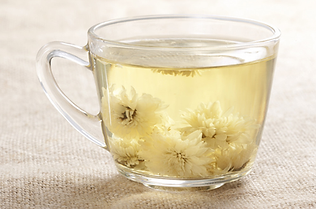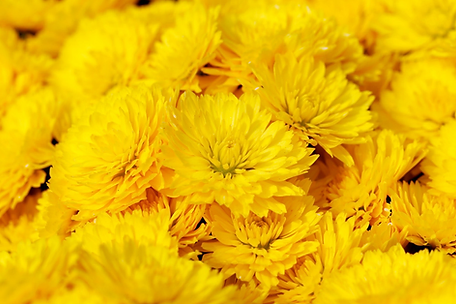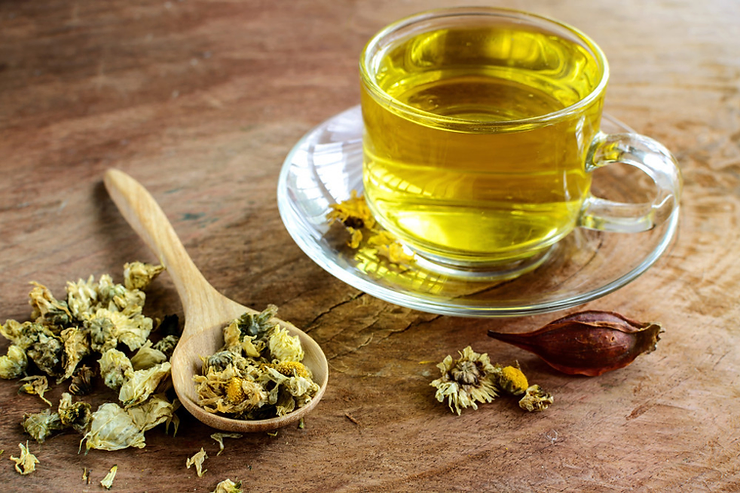
Drinking tea is very much in vogue. Tea is second only to water, world wide, as the most preferred beverage. Three billion cups of tea are drunk daily, with black tea being the most popular. There are many health benefits to drinking tea. According to Penn Medicine, “numerous studies have shown that a variety of teas may boost your immune system, fight off inflammation, and even ward off cancer and heart disease.”
One tea I’ve been hearing about lately is Chrysanthemum tea. This is the time of year when you see a multitude of “mums” peppering landscapes, front porches, and entrances to homes and businesses. After hearing how popular Chrysanthemum tea has become, I decided to delve into the topic and see whether this type of tea contains properties that are beneficial to your health. Since I am into sustainability and repurposing things, I thought it would be interesting to learn yet another way to use these beautiful flowers before throwing them into a compost pile.
For more information on Chrysanthemums in the garden click How to Grow Chrysanthemums.
(Some of the links within this post are affiliate links on which I receive a small compensation from the sale of certain items with no extra cost to you.)
(As an Amazon Associate I earn from qualifying purchases.)
Medicinal Benefits of the Chrysanthemum Flower

Is Chrysanthemum tea really good for you?
In researching the topic it was difficult to find definitive evidence or studies showing that Chrysanthemum tea has lasting health benefits. However, many sites state that it may improve your health.
Chrysanthemum tea is widely drunk in Asian countries. For instance, in China Chrysanthemum tea is drunk every day and is considered a health drink. According to Quora, “modern medical analysis shows that Chrysanthemum tea contains volatile oil, Chrysanthemum glycosides, amino acids, flavonoids, adenine, various vitamins and trace elements and many other components that are beneficial to health”.
Read on to learn of some health benefits from drinking one to two cups of Chrysanthemum tea each day.
Calming Effect
In Asian countries, Chrysanthemum tea is sipped at night to help alleviate anxiety and insomnia. It calms people down by lowering blood pressure and cooling the body from the inside out. This particular tea has a high concentration of potassium which “widens blood vessels and increases blood flow”. Proper blood flow will help calm you down and regulate stress hormones, making it easier to fall asleep.
Boost Immunity
Vitamin A, vitamin C, potassium, magnesium, and calcium all help to create stronger immune systems which help your body’s natural defense against illnesses. Chrysanthemum tea contains substantial amounts of these substances. They help fight against free radicals which can harm your body.
Other vitamins and minerals found in Chrysanthemum tea are essential for proper cell function. They also aid in digestion by balancing stomach acids and preventing gut lining decay which can compromise the immune system.
Can Help Relieve Early- Stage Cold Symptoms
This antioxidant rich tea has anti-inflammatory properties. It can soothe a sore throat and relieve mild fevers in the early stages of a cold. It may also relieve stuffy noses.
Pair your Chrysanthemum tea with honey to help ease these symptoms.
Decrease Inflammation and Promote Good Skincare
Chrysanthemum tea has a large amount of beta-carotene which breaks down into Vitamin A, an antioxidant. I’m sure you’ve heard of the value of antioxidants with regard to skincare. Antioxidants help in reducing wrinkles.
In Chinese medicine, eating spicy foods, or foods with too much “heat”, is considered a cause of inflammation. Inflammation can present itself in skin outbreaks or dry mouth. Chrysanthemum tea may help improve the circulation and control you’re body’s ability to regulate its internal temperature, reduce stress hormones in the blood, and decrease inflammation.
Chrysanthemum tea has also been used topically to control skin redness and itchiness.
Improves Vision
For years vitamin A and betacarotene have been associated with good eye health. Chrysanthemum tea is a good herb for the eyes that helps clear the heat and is popular for treating eye irritation including red, teary, or dry eyes.
Try using it as a cold compress after allowing the tea to cool.
Hangover Remedy
According to WebMD, Chrysanthemum tea improves alcohol metabolism. This process helps break down and eliminate the alcohol in your system and can also protect the liver from the damaging effects of alcohol consumption. It will not reduce a the effects of a whole night of drinking, but it will help reduce some of the nasty effects of over-imbibing.
For more information on the benefits of Chrysanthemum tea, click Medlicker.
Disclaimer/ These practices have been used throughout the centuries, however, please consult your physician before using Chrysanthemum tea as a substitute for or supplement to medicines.
Side Effects of Chrysanthemum Tea
If you drink too much Chrysanthemum tea, you may experience some of these side effects.
Interactions With Other Drugs
You should avoid Chrysanthemum tea if you are diabetic and on insulin medications. There could be an interaction between Chrysanthemum tea and insulin.
Since Chrysanthemum tea lowers blood pressure and helps calm you, it is not advisable to drink this tea if you have high blood pressure and are on medication for this condition.
Also, if you are on anti-inflammatory, anti-cancer or antibacterial medications, you should avoid this kind of tea. It does not react well with theses forms of medications.
Causes Allergies
If you are prone to allergies caused by dandelions, daisies, sunflowers or ragweed, avoid sipping on Chrysanthemum tea. You may develop skin rashes, fever, asthma, or inflammation.
If any of these symptoms occur, see a skin specialist.
Sensitivity to Light
Drinking Chrysanthemum tea could lead to photosensitivity. If you have fair skin and drink this tea on a regular basis, be sure to use sunscreen and wear sunglasses to block the sun’s rays.
Chrysanthemums and Pyrethrin
Pyrethrin is a natural pesticide found in some Chrysanthemums. It has been synthetically reproduced over the years in industries for use as insecticides for pests in gardens and for agricultural purposes. Pyrethrin contains a mixture of 6 chemicals that are toxic to insects.
Gardening Tip:
As a natural control of unwanted insects in your garden, plant Chrysanthemums!
Because pyrethrin turns into a poison, the website Medlicker says drinking too much Chrysanthemum tea can poison a human body. Pyrethrin can cause “damage to the nervous system and other organs like the eyes”.
Chrysanthemums and Pregnancy
Caution should be taken when pregnant. Do not take herbal teas or “natural” vitamins or minerals without consulting your doctor. There have not been any conclusive studies on how the unborn child will react to Chrysanthemum tea, but caution should be taken. Also, consult a physician before ingesting Chrysanthemum tea while nursing.
Is Chrysanthemum Tea Really Good For Your Health?
This question of whether you felt better after drinking Chrysanthemum tea was posed on Reddit. Here is a summary from those who responded and regularly imbibed on Chrysanthemum tea.
The consensus was it tastes good, has a mildly sweet, honey flavor, and seems to help alleviate symptoms of the common cold. One other person believed it soothed his sore throat that he usually has after a day of teaching classes.
Others said it has a cooling effect on their bodies and feels great when used as an herbal bath: that it does wonders for their skin.
How to Make Chrysanthemum Tea

If you would like to try and create your own tea, below is a simple recipe I found and would like to share with you.
Ingredients:
3 to 6 dried Chrysanthemum flowers (yellow or white blossoms)
One cup of boiled water that has cooled for a minute or two
Honey, white sugar, sugar in the raw
Directions:
Pluck many blossoms from a yellow or white Chrysanthemum plant and allow them to dry in the sun or on a cookie sheet on top of a surface for a few days.
Once dry, boil water and pour it into a cup.
Allow the water to cool to approximately 208 degrees F (approximately 1 to 2 minutes) which is just below boiling temperature.
Add 3 to 6 dried blossoms to the water.
Steep for 5 minutes.
Add a slice of lemon with some sugar, honey, or sugar in the raw.
Is Chrysanthemum Tea Really Good For Your Health?
You have learned the benefits and hazards of drinking Chrysanthemum tea. Chrysanthemum tea has many health benefits but be aware of the risks of drinking this kind of tea. If you would like to try Chrysanthemum tea, begin with just one or two cups a day and take notice of any physical or mental reactions. After taking note of any symptoms both positive and negative, you can then decide if Chrysanthemum tea is right for you.
I hope you have enjoyed this post. Please leave a comment below and share it with friends and family.
Happy Gardening!
Nina
